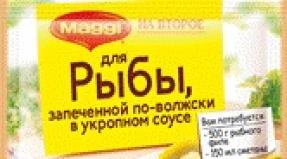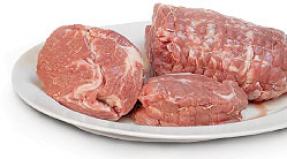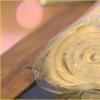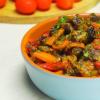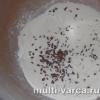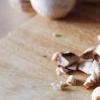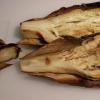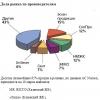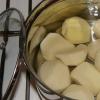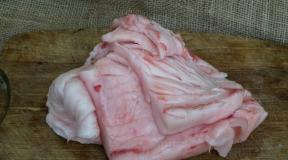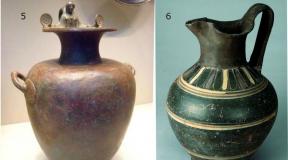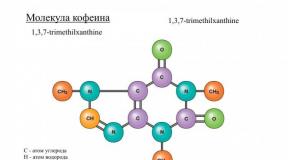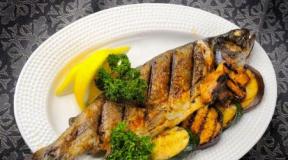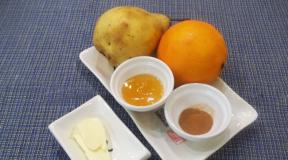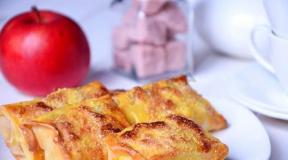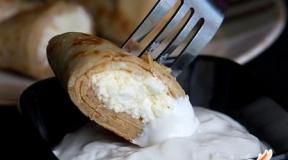The calorie content of cottage cheese is 9 percent with fresh currants. Why is cottage cheese useful - fat-free or fat
Curd is a popular dairy product. It is a concentrate of ordinary sour milk. All the elements that a person needs for health are contained in it in even greater quantities.
What can we say, if a maximum of 200 grams of concentrated fermented milk mass is obtained from 0.5 liters of milk. The product is healthy and nutritious. It is widely used for culinary purposes for preparing second courses and desserts.
We invite you to find out how many calories there are in cottage cheese of different fat content, what is the energy value of popular cottage cheese products and what effect it has on the body.
Chemical composition and nutritional value
The product is a rich source of proteins. Let's highlight the high capacity of vitamins A (100 grams of medium-fat cottage cheese contains 9% of the daily requirement for this substance), B1 (2.7%), B2 (16.7%), PP (16%).
Phosphorus (27.5% of the daily value), calcium (16.5%), magnesium (6%), potassium (4.5%), sodium (3.2%), iron ( 2.5%).
All nutrients are ideally balanced, so the product is perfectly absorbed by the body.
How much proteins, fats and carbohydrates in the cottage cheese depends, first of all, on the fat content. In a product with 4% fat, the ratio of BJU components is 11 grams, 4 grams and 3 grams per 100 grams of product, respectively. Homemade (18% fat) contains more proteins (15 g) and fats (18 g), while the amount of carbohydrates remains almost unchanged: 2.9 g.
Calorie content of cottage cheese per 100 grams
The different types of food are officially classified according to the percentage of fat content. In bold - 18%, in bold - 9%, in fat-free - no more than 3% (according to GOST - up to 1.8%).
The last category also includes a grain variety, the popularity of which is steadily growing among Russian consumers. It is understandable: delicious, tender, dietary cottage cheese cannot but be liked.
And what is the calorie content of cottage cheese 5%? To make it easier for you to navigate, we provide information on the energy value of 100 grams of a product of varying degrees of fat content:
- Fat-free cottage cheese: 71 kcal;
- 1% fat: 79 kcal;
- 2% fat: 86 kcal;
- 4% fat: 104 kcal;
- 5% fat: 121 kcal;
- 8% fat: 138 kcal;
- 9% fat (bold): 159 kcal
- 18% Fat: 236 kcal
In fat-free
Today, a thin and slender figure is considered beautiful. Therefore, millions of women struggle with obesity, make up a low-calorie diet and try to follow it. Low-fat products are in great demand nowadays.
Everything is logical: the lower the nutritional value of the food, the better for the diet and for the figure. Therefore, when choosing fermented milk products, the fair half often prefer their low-fat varieties. For the production of a fat-free product, low-fat milk varieties are used.
It is well absorbed by the body; it contains a wide range of useful elements.
The calorie content of fat-free cottage cheese is 71 kcal per 100 grams. In 1% product, the energy value is 79 kcal.
In cottage cheese "Brest-Litovsk 3% Classic" - 97 kilocalories per 100 grams.
Low-fat cottage cheese is widely used in cooking; it is included in dozens of low-calorie dishes that form the basis of the diet. Low-calorie low-fat cheese cakes, cheesecakes, dumplings, delicious casseroles using a low-fat product have minimal differences from dishes made from more fatty varieties of fermented milk mass.
By including this product in your daily menu, you will not gain weight, even if you mix the mass with fruit. Low-fat cottage cheese with banana is a tasty and healthy dish for those who want to lose weight. Adding a spoonful of honey will not affect the number of calories too much, while at the same time, it will seriously increase the capacity of valuable substances.
In bold (homemade)
Among the products made on the basis of milk, an important place is given to cottage cheese. It has a lot of useful characteristics and unique qualities. Regular intake of the product is a guarantee of health. The final fat content of the concentrated fermented milk mass depends on the preparation method and the chemical content of the feedstock.
Fatty cottage cheese (homemade) has the highest nutritional value. fat in it reaches 18%. It has a delicate creamy consistency and pronounced taste. It is used for making dumplings, cheese cakes, casseroles, desserts and other dishes. How many calories are in homemade cottage cheese? 3 times more than fat-free.
Excessive consumption of this product is undesirable for people who are prone to obesity and are overweight. Nevertheless, the beneficial properties in this case are more pronounced than in the low-fat curd mass.
The product strengthens teeth, hair and bones, stimulates the protective properties of the body, normalizes the state of the nervous system.
It must be present in the diet of children, pregnant women, the elderly and those who are recovering from serious illnesses.
The calorie content of homemade cottage cheese is 236 kcal.
In cottage cheese with sour cream
Cottage cheese with sour cream is one of the most common ways of consuming this fermented milk product:
- By mixing 200 grams of homemade milk cottage cheese (18% fat) with 50 grams of sour cream 15% fat, you will consume 551 kcal, and the calorie content of 100 grams of the product will be 220 kcal.
- If the supplement contains 20% fat, the energy value of a serving will be 576 kcal, 100 g - 288 kcal.
- The most dietary option is a mixture of low-fat cottage cheese with sour cream 10% fat. The calorie content of 250 g of the dish will be 278 kcal, 100 g - 111 kcal.
- Let us mention semi-fat cottage cheese (9%) with 35% fat cream. The energy value of a portion of 250 g (200 + 50) reaches 487 kcal, 100 g - 195 kcal.
Each tablespoon of sugar will increase the energy value of the dish by 80-90 calories.
Calorie table of cottage cheese products per 100 grams
Cottage cheese is a healthy product, but do not forget that it contains too much protein. Therefore, consume the product in small portions.
The daily consumption rate of cottage cheese for adults is 200 grams, for children - 120 grams. It is important to follow the rules for storing the product. It should be stored exclusively in the refrigerator, no more than 2-3 days.
In conclusion, we suggest that you familiarize yourself with the calorie content of popular curd products.
| Goat curd | 156 kcal |
| Quark | 46 kcal |
| Grainy | 155 kcal |
| Curd cream | 167 kcal |
| Baby curd | 103 kcal |
| Curd whey | 18 kcal |
| Cottage cheese | 317 kcal |
| Curd jelly | 165 kcal |
| Curd | 232 kcal |
| Milkana curd cheese | 269 kcal |
| Tofu curd | 73 kcal |
| Cheese cake | 239 kcal |
| Syrniki | 183 kcal |
| Curd "Miracle" | 131 kcal |
| Glazed curd cheese | 407 kcal |
| Whipped cottage cheese with fruit (ingredients: cottage cheese, raspberries, apples, honey, almonds, sugar, milk) | 192 kcal |
Why is cottage cheese useful?
Cottage cheese is rich in protein, which is responsible for the formation of muscle tissue. Therefore, it is so appreciated by athletes and bodybuilders. Interestingly, the protein content depends on the fat content of the food. This indicator can range from 15% (in fatty homemade) to 9% (in fat-free). Note that curd protein is completely absorbed by the human body.
All dairy products contain calcium, but not everyone can consume whole milk: some adults do not have enough lactase enzyme that breaks down milk sugar.
As a result, milk intake can lead to disorders. Calcined curd is a great alternative. Consumption cannot lead to such problems, and the calcium content in it is even higher than in milk.
This element is essential for dental health and bone strength.
Deficiency of vitamins of group B, A, E, PP, leads to a decrease in immunity, disorders of the nervous and digestive systems. By consuming fermented milk products, you will protect yourself from these troubles.
The composition of curd protein contains the amino acid methionine, which is irreplaceable for the human body, which protects the liver from fatty degeneration.
It is important to consume concentrated fermented milk mass in the event that your metabolic processes are disturbed (a clear sign of this are ailments such as gout, obesity, thyroid disease).
The complex protein, casein, which is part of the curd, is rich in all valuable amino acids. In addition, this protein has a lipotropic effect, which helps accelerate the breakdown of fats and reduce the concentration of harmful cholesterol in the circulatory system. Therefore, the product should be consumed by the elderly, children suffering from anemia, tuberculosis, liver, stomach and intestinal diseases.
Also, cottage cheese must certainly be present in the diet of pregnant women. Protein, calcium, phosphorus, iron, vitamins are the main plastic materials necessary for the normal development of the embryo.
If the embryo lacks calcium, it compensates for the deficiency by absorbing this trace element from the mother's body. As a result, a pregnant woman suffers from general weakness of the muscular apparatus, increased fragility of bones and teeth.
Iron is an element that plays an important role in the development of the circulatory system of the embryo. A lack of this substance leads to the development of anemia in the mother and increases the likelihood of miscarriage.
Source: http://wjone.ru/253-skolko-kaloriy-v-tvoroge
Cottage cheese - calorie content, properties, benefits
Cottage cheese belongs to one of the most famous and useful fermented milk products. In addition to the taste for which it is famous, cottage cheese has many healing properties for the body.
According to historical evidence, cottage cheese was already known in Ancient Rome.
In Russia, it was traditionally obtained from curdled milk - ordinary sour milk, which was placed in a preheated oven in an earthen pot, after which the curdled curdled milk was poured into a linen bag so that the resulting whey glass.
After that, the curd was put under a press so that the whey was completely separated and a sufficiently dense mass was formed. Similarly, cottage cheese is prepared at home today.
- Bold (18% or more);
- Bold (dietary soft, 9%);
- Low-fat (up to 3%).
Cottage cheese is also distinguished by the method of coagulation of milk proteins. It happens:
- Acidic, usually made from skim milk. In this case, the protein folds under the action of lactic acid, which is formed during lactic acid fermentation;
- Acid-rennet, prepared with the simultaneous use of lactic acid bacteria starter culture and rennet.
The composition of the curd
The nutritional value of cottage cheese is higher than that of milk, since usually about 200 g of cottage cheese can be prepared from 500 g of milk. In addition, the nutritional value of cottage cheese depends on its fat content. So, it contains:
- Fatty contains 15 g of proteins, 18 g of fats, 2.8 g of carbohydrates;
- In bold - 18 g of proteins, 9 g of fat, 3 g of carbohydrates;
- Low-fat contains 22 g of proteins, 0.6 g of fat, 3.3 g of carbohydrates.
The curd contains:
- Vitamins - A, D, C and B vitamins;
- Minerals - iron, calcium, phosphorus;
- Lactose (milk sugar);
- Enzymes.
Calorie content of cottage cheese
The calorie content of cottage cheese depends on its fat content. So, low-fat cottage cheese 0.6% contains 110-120 kcal, bold 9% - 169 kcal, fat 18% - 236 kcal.
The most beneficial for health is cottage cheese, which is low in calories and fat. Also, depending on the calorie content, cottage cheese is used both for diets and nutrition of athletes, and for preparing various dishes.
Useful properties of cottage cheese
Cottage cheese is an irreplaceable product for a healthy and nutritious diet. The beneficial properties of cottage cheese are due to the technology of its preparation, as a result of which two valuable components are released from it - milk fat and easily digestible milk protein. Milk protein (casein) has a high nutritional value and can replace animal proteins.
One of the useful properties of cottage cheese is the amino acids it contains, which are necessary for the prevention of liver diseases.
Cottage cheese is rich in phosphorus and calcium, without which the proper formation of bones and skeletal system is impossible. These minerals are especially needed:
- With fractures;
- Children during the growth of teeth and bones;
- With hypertension and heart disease;
- With rickets;
- With kidney disease;
- Pregnant women;
- To old people.
Another useful property of cottage cheese is due to the lactic acid bacteria included in its composition, which improve the functioning of the gastrointestinal tract, and also normalize intestinal motility.
The benefits of cottage cheese
The benefits of cottage cheese as a source of calcium, amino acids and vitamins for children and the elderly have been proven.
In addition, cottage cheese contributes to the normalization of the nervous system, an increase in the level of hemoglobin in the blood and can be used as a prophylactic agent for metabolic diseases.
In baby food, the benefits of cottage cheese are noted when it is used as part of diets in the treatment of diseases of the kidneys, liver, digestive system, lungs and cardiovascular system.
The benefits of cottage cheese have also been proven:
- To increase the production of growth hormone. Back in the 70s of the last century, it was found that the use of proteins increases the level of growth hormone;
- For weight loss. Many studies show that cottage cheese and other milk proteins are effective in burning fat;
- To increase muscle mass. The amino acids in cottage cheese, which provide muscle and other tissue building, are preferred over other protein sources for muscle building. In addition, cottage cheese is rich in calcium, which contributes to an increase in testosterone levels, and, as a result, to rapid muscle growth;
- As a prevention of atherosclerosis, since curd contains calcium and phosphorus salts, as well as methionine and choline.
Storage conditions for cottage cheese
Cottage cheese is a perishable product. It must be stored in the refrigerator for no longer than 2-3 days. Also, to prevent deterioration, it should not be stored in plastic bags. The best way to store cottage cheese is enamel or glassware.
It is recommended to freeze home cottage cheese for long-term storage. In this case, it does not lose its beneficial properties, although the taste becomes somewhat lower.
Application of cottage cheese
As a source of easily digestible protein and calcium, it is recommended to eat cottage cheese daily up to 200 g.
Also, many nutritionists advise including it in various diets for weight loss:
- 400 to 600 g low-fat cottage cheese with 60 g sour cream, divided into four meals. In addition, during the day, you can drink up to 100 ml of coffee or tea with milk and up to 2 glasses of rosehip broth;
- Three times a day, 100 g of low-fat 0.6% cottage cheese and 900 g of kefir, divided into six doses.
Eating cottage cheese before bed is a popular practice among bodybuilders and strength athletes. It is believed that during sleep, muscles recover and grow, and curd is a catalyst for these processes. Of course, in these cases, low-calorie fat-free cottage cheese should be preferred.
Cottage cheese has long been used in folk medicine in the treatment of strokes, bruises, and tumors. It is used for compresses, which are prepared from 2 tbsp. spoons of natural cottage cheese with 1 tbsp. a spoonful of honey. When treating burns, lukewarm cottage cheese should be applied up to three times a day to the burned area.
In addition, cottage cheese is also used for cosmetic purposes in the preparation of various creams and masks for the face and body.
With different calorie content, cottage cheese is widely used by chefs all over the world. Many different desserts are prepared from it - cheesecakes, soufflés, curds, casseroles, muffins, cakes, cheesecakes and many other dishes.
The harm of cottage cheese
Cottage cheese does not cause harm in cases where you eat low-fat types with low calorie content. It is also necessary to carefully observe the recommended storage conditions and you should not eat cottage cheese that is stored for more than 2-3 days from the date of preparation.
Cottage cheese is considered a healthy product suitable for almost everyone. Cottage cheese can be harmful only in cases of individual intolerance to fermented milk products, as well as if it is eaten in excessive quantities.
Damage from curd can also occur with the regular use of a “curd product” that has been added with starch and other third-party ingredients to increase calorie content and shelf life.
Source: http://www.neboleem.net/tvorog
About the calorie content of cottage cheese and dishes with its use
Cottage cheese is a popular fermented milk product that is produced in the process of fermentation of milk and further separation of whey. It is a source of complete protein required for the synthesis of musculoskeletal tissue.
It contains vitamins A, B1, B2, C, E, PP and the basic amino acids methionine and tryptophan, which promote hematopoiesis and normalize the activity of the nervous system.
It also contains beta-carotene, which normalizes metabolism in the body, as well as a large amount of trace elements necessary for the normal functioning of the human body (potassium, magnesium, iron, zinc, phosphorus, fluorine, selenium, etc.).
Unlike other animal foods, curd protein is neutral in acidity and is easily digestible. It uses less gastric juice and enzymes for digestion, so it is suitable even for people with diseases of the gastrointestinal tract and is the basis of many diets.
Types of cottage cheese, their calorie content and nutritional value
According to the method of preparation, cottage cheese is acidic (prepared from skim milk when exposed to lactic acid) and acid-rennet (with the addition of rennet). Depending on the fat content of the milk used in the production process, the following varieties of this product are distinguished:
- fat (19 - 23%);
- classic (4 - 18%);
- low-fat (1.8 - 2%);
- fat-free (up to 1.8%).
There are also other classifications: homemade, granular, calcined. The latter contains an additive in the form of calcium chloride; with a low calorie content, it contains a large amount of protein - up to 60%. Home-cooked cottage cheese can have a different degree of fat content, and therefore, a different energy value.
The calorie content of homemade cottage cheese ranges from 230 to 265 kcal per 100 g. It is very useful for the body, but for those who want to lose weight, it is hardly suitable. In granular, which is a curd grain with the addition of salted cream, the caloric value per 100 grams is much lower: 100 - 150 kcal.
It contains a minimum amount of fat (0 - 0.9%) and is widely used in dietary nutrition.
The fat content of cottage cheese is directly related to its nutritional properties. Data on the nutritional value of its most common types are presented in the table.
| Type of cottage cheese (100 g) | Calorie content (kcal) | Proteins (g) | Fat (g) | Carbohydrates (g) |
| fat content 0% | 78,98 | 15,92 | 0,36 | 2,59 |
| fat content 5% | 116,20 | 15,00 | 5,00 | 2,40 |
| fat content 9% | 154,95 | 16,18 | 8,51 | 2,78 |
| fat content 15% | 183,82 | 15,38 | 12,93 | 1,76 |
| fat content 20% | 165,00 | 12,40 | 12,25 | 2,45 |
| fat content 23% | 301,07 | 9,55 | 21,44 | 16,99 |
The best option for inclusion in the daily diet is cottage cheese with a fat content of 2 - 5%. With a relatively low calorie content, the amount of nutrients in it is more balanced than in its fat-free counterpart.
Influence on the calorie content of products added to cottage cheese
The calorie content of cottage cheese is influenced by the products that are added to it to improve the taste and enhance the beneficial properties. Most often it is eaten with dried fruits, nuts, honey, various types of preserves and jams, fresh berries and fruits, vegetables and herbs. The table shows the calorie content of some foods that can be added to cottage cheese.
Cottage cheese can be used not only as an independent product, but also be the basis for many dishes. For dieters, it is important to know the calorie content of each of them.
Dumplings - 203 kcal when using fat-free cottage cheese as a filling (with a fat content of 19% - 284 kcal / 100 g). Low-fat cottage cheese pancakes (2%) contain 183 kcal.
Cottage cheese casserole with a low percentage of fat - 168 kcal (with a fat content of 5 - 9% - from 213 to 249 kcal). Cottage cheese with sour cream (20% fat or more) is from 139 to 228 kcal.
An alternative to traditional options that are high in calories is dietary dishes. For example, curd cakes can be baked in the oven rather than fried in oil. An easy-to-prepare curd omelet is a high-protein, low-calorie dish. Low-calorie cottage cheese and carrot casserole will also diversify the menu.
Another healthy high-protein dietary meal is called "belip" ("no lipids", ie, no fat): low-fat cottage cheese, cod fillet, raw chicken protein and onions are passed through a meat grinder and then baked in the form of meatballs.
Using cottage cheese for weight loss
Cottage cheese is not only important for the body; when consumed, a feeling of satiety quickly arises. It allows you to eat a variety of foods without gaining excess weight, normalizes digestion, and helps to eliminate toxins from the body.
The product has a lipotropic effect (enhances fat metabolism), regulates blood sugar and cholesterol levels.
Despite the opinion that such food is indispensable for dietary nutrition, there is more and more information that low-fat cottage cheese (0.1 - 0.8%) does not bring benefits to the body. With a deficiency of fat in the body, serious disturbances can occur. For weight loss while maintaining a nutritious diet, a product with a fat content of 1.8 to 5% is better.
It should also be remembered that during the production of an industrial method, trans fats, preservatives, stabilizers and other harmful components can be added to the curd. For example, starch is often used to improve consistency.
You can check its presence by adding pharmaceutical iodine. If the iodine spots turn blue, it means that starch is present in this product, which increases its calorie content and slows down the process of weight normalization.
Usually starch is found in pasty curds and products labeled "curd product".
To lose weight and maintain health, it is better to buy ordinary low-fat cottage cheese and add fruits, berries and other components to it yourself.
Rates of consumption and storage of cottage cheese
This dairy product is undoubtedly useful and helps to lose weight, but nevertheless it is a natural protein-calcium concentrate, and therefore it is worth observing the measure when using it.
Too much protein can negatively affect kidney function. A high-fat product increases cholesterol levels, which leads to obesity and the development of atherosclerosis.
Granular cottage cheese is more useful, although it also has some contraindications, such as individual intolerance.
According to nutritionists, the average protein intake is 0.86 - 0.95 g / kg of body weight. That is, the average person weighing 55 kg can consume 47 g of protein per day. But since it is known that 10-15% of protein from food is not absorbed, the amount should be slightly increased (about 50 g).
A pack of cottage cheese contains approximately 32 g of protein. This means that 1.5 - 2 packs is for such a person the daily protein intake, without additional products. But during the day, we usually eat other protein foods, so experts recommend eating no more than 200 g of cottage cheese per day.
Another important point is storage. This product is unstable, therefore, even with small violations of the temperature regime, its quality deteriorates significantly.
The shelf life of homemade, fatty and low-fat cottage cheese at a temperature of 2 to 6 ° C is 36 hours. Store (with stabilizers) can be stored for 7 days, heat-treated - for 14 days.
Curd products are stored for 36 hours at a temperature of 0 - 2 ° C.
Cottage cheese is an important food product, one of the main sources of protein in our diet, along with meat and fish.
It stimulates the growth of new tissues, improves fat metabolism, strengthens the nervous system, has a beneficial effect on the immune system and has many other useful properties.
But in order for this food to bring benefits to the body, to serve as a source of health and strength, when included in the daily diet, it is necessary to control its consumption, taking into account the individual characteristics of your body.
Source: http://KtoStroynee.ru/kalorijnost/molochka/tvorog-obezzhirennyj.html
Benefits, harm, calorie content of cottage cheese per 100 grams
The calorie content of cottage cheese is 0 percent per 100 grams 71 kcal. 100 g of the product contains:
- 16.4 g protein;
- 0 g fat;
- 1.4 g of carbohydrates.
0% cottage cheese is saturated with vitamins A, C, PP, group B, as well as minerals potassium, magnesium, calcium, phosphorus, sodium, iron.
Low calorie content of fat-free cottage cheese per 100 grams: losing weight with benefit
The low calorie content of fat-free cottage cheese per 100 grams allows you to use this product with any diet.
Interesting: Calorie content of tomatoes with sour cream
Nutritionists say that such dairy products are indispensable for losing weight, since such cottage cheese contains a fairly large amount of protein (more than 15 g). Recall that in accordance with the current WHO regulations, men are recommended to consume 0.75 g of protein per 1 kg of body weight per day; for women, this figure is 0.5 g of protein per 1 kg of body weight.
Caloric content of 1% cottage cheese per 100 grams
Calorie content of 1% cottage cheese per 100 grams 79 kcal. 100 g of the product contains 16.2 g of protein, 1 g of fat, 1.3 g of carbohydrates. Cottage cheese is saturated with fluorine, copper, calcium, magnesium, it is recommended for strengthening bones, normalizing heart function.
In cooking, 1% cottage cheese is used to make casseroles, cakes, pancakes, dumplings, cheesecakes.
Calorie content of cottage cheese 2 percent per 100 grams
The calorie content of cottage cheese with 2 percent fat per 100 grams is 102 kcal. 100 grams of product contains 17.9 g of protein, 2 g of fat, 3.4 g of carbohydrates. 2% cottage cheese is saturated with amino acids. Due to the rich amino acid composition, the proteins of the dairy product are absorbed much better than the proteins of meat or fish.
Calorie content of cottage cheese 5 percent per 100 grams
The calorie content of cottage cheese with a fat content of 5 percent per 100 grams is 120 kcal. 100 g of product contains 17.1 g of protein, 5 g of fat, 1.9 g of carbohydrates. Due to its good vitamin and mineral composition, 5% cottage cheese is recommended to improve the functioning of the gastrointestinal tract, increase immunity, and saturate the body with energy.
Calorie content of cottage cheese 9 percent per 100 grams
The calorie content of cottage cheese is 9 percent per 100 grams of 160 kcal. 100 g of the product contains 16.8 g of protein, 9 g of fat, 2.1 g of carbohydrates. 9% cottage cheese is irreplaceable after viral infections, to increase immunity in the postoperative period.
Interesting: Calorie content of sugar per 100 grams
Contraindications to the use of the product are violations in the liver, in which it is necessary to minimize the intake of calcium and protein into the body.
Calorie content of homemade cottage cheese per 100 grams
The calorie content of homemade cottage cheese per 100 grams when preparing a product from 1 percent milk is 167 kcal. In 100 g of such cottage cheese there are 17.7 g of protein, 6.5 g of fat, 11.4 g of carbohydrates.
Homemade cottage cheese recipe:
- 3 liters of 1% sour milk are mixed with 0.6 liters of kefir, heated over low heat to a temperature of 35 ° C;
- while the milk is heating, it is covered with a colander folded in 6 layers (the edges of the fabric should hang freely from the colander);
- the colander is attached to the whey drainage container;
- heated milk is thrown into a colander and drips a little in it;
- without squeezing the resulting mass, the corners of the fabric are tightened with a knot;
- the knitted fabric is suspended over the whey container;
- after a few hours, the excess liquid will drain and the curd will be ready.
Calorie content of cottage cheese with sour cream and sugar per 100 grams
The calorie content of cottage cheese with sour cream and sugar per 100 grams is 169 kcal. 100 g of product contains 13 g of protein, 8.6 g of fat, 9.3 g of carbohydrates. To prepare a sweet dish, you need to grind 0.2 kg of cottage cheese with 25 g of sugar, mix the resulting mass with 40 g of sour cream.
Calorie content of cottage cheese with raisins per 100 grams
The calorie content of cottage cheese with raisins per 100 grams depends on the amount and type of products that make up the sweet dish. When mixing 10 g of raisins and 90 g of cottage cheese, the number of calories will be:
- for cottage cheese 0 percent - 90.3 kcal;
- for cottage cheese 1 percent - 97.5 kcal;
- for cottage cheese 2 percent - 118.2 kcal;
- for cottage cheese 5 percent - 134.4 kcal;
- for cottage cheese 9 percent - 170.4 kcal;
- for homemade cottage cheese - 176.7 kcal.
Calorie content of granulated cottage cheese per 100 grams
The calorie content of granulated cottage cheese per 100 grams at 5% fat content of the product is 105 kcal. In 100 g of such cottage cheese, 12.7 g of protein, 5 g of fat, 2.4 g of carbohydrates. The grain product contains a hardener, starter culture, skim milk, an enzyme preparation, salt, cream, potassium sorbate.
The benefits of cottage cheese
The following benefits of cottage cheese are known:
- due to the high content of easily digestible proteins, cottage cheese is useful for people of all ages;
- low-fat cottage cheese is saturated with vitamins and minerals, has a minimum calorie content, which makes it an essential component of dietary nutrition;
- low-fat cottage cheese is indispensable for children aged 3 years and older, it is necessary to maintain the protein balance in the body during breastfeeding and pregnancy;
- cottage cheese minerals strengthen teeth, bones, hair, ensure the health of blood vessels and heart muscle;
- cottage cheese is saturated with tryptophan and methionine, which prevent liver obesity, normalize the function of the gallbladder;
- The minerals in curd are important for the health of the nervous system.
The harm of cottage cheese
The harm of cottage cheese is manifested when eating a poor-quality product or overeating. When buying, be sure to pay attention that all the requirements for heat treatment and storage of cottage cheese are met.
Contraindications to the use of cottage cheese are:
- exacerbated kidney disease;
- high cholesterol;
- tendency to obesity and atherosclerosis;
- intolerance to the product;
- exacerbation of diseases of the stomach and intestines.
SUBSCRIBE WEBSITE UPDATES
Many adults and children are very fond of cottage cheese. It is known that it has a lot of useful properties and is very often found in the dietary or simply healthy food menu. You should learn more about how regular consumption of this dairy product affects the body.
Chemical composition of curd
The list of useful properties of any product directly depends on what vitamins, minerals, trace elements are included in the composition, what effect their presence has on the body. As for cottage cheese, the level of fat content and calorie content play a huge role. Also influenced by the type of product and the method of production, thanks to which it is obtained.
Calorie content
The indicator is influenced by the degree of fat content. Per 100 g is:
- The calorie content of fat-free cottage cheese (0-0.6%) is 80-100 kcal. As a rule, this is a store product.
- The calorie content of 5 percent is 145-155 calories. Basically, this level of fat content is inherent in a grain product.
- The calorie content of cottage cheese is 9 percent - up to 160 kcal. It is called bold.
- The calorie content of 18 percent is up to 260 kcal for a store product. If it is homemade, it may be more fatty.
What is contained in cottage cheese
Energy value of 100 g of product by fat levels:
| Fat content of the product | Carbohydrates (g) |
||
Cottage cheese is rich in:
- vitamins of group B, C, H, A, PP, E;
- beta carotene;
- casein;
- gray;
- phosphorus;
- calcium;
- potassium;
- chlorine;
- choline;
- sodium;
- magnesium;
- iron;
- zinc;
- copper;
- selenium;
- fluorine.
The benefits and harms of cottage cheese for the body
Each fermented milk product is perceived differently by the body. One type will be more useful for an adult, another for a child, and the third for an elderly person. The effect on human health depends on many factors. Thinking about the usefulness of cottage cheese, one cannot but remember that the method of production plays a key role here, because the product can be made both in the factory and with your own hands with the addition of completely different ingredients.

Home
From such an organism can get a lot of calcium, which is necessary to strengthen bones, teeth, improve the condition of hair and nails. Therefore, it is recommended to include it in the children's diet. When making homemade cottage cheese from both cow and goat milk, the maximum amount of nutrients is released. It is easily absorbed by the body, has a positive effect on the digestive and nervous systems.
Remember a few safety precautions when consuming a homemade product:
- Try to eat no more than 0.2 kg per day.
- Do not try to freeze curd that has been left on for three days. It deteriorates very quickly.
- It should be used with caution by people who have kidney problems.
- The homemade product has a high percentage of fat. If you're on a weight loss diet, try lower-calorie options.

Grain
This is recommended to use for hypertension, ischemia, and other heart diseases. Experts advise eating a granular product for diseases of the gastrointestinal tract to replenish the reserves of protein and calcium in the body. If you are obese, you should eat cottage cheese raw, without mixing it with other foods. The same applies to people who have problems with the liver, gall bladder. Brie of pregnancy is a grain product that is essential for the full development of the fetus.

Curd mass
You already know how useful pure cottage cheese is, but it is worth mentioning separately about the products in which it is taken as a basis. Natural pulp has the same degree of usefulness as the product itself. However, when choosing it, you must carefully study the composition. Make sure that the list of ingredients does not contain dangerous preservatives, dyes, chemicals. A product with their content will not benefit the body. It is also important to remember that the curd mass cannot be considered dietary.
Serums
The liquid that remains after the production of cottage cheese also has useful properties and is suitable for consumption. It helps to improve liver function, intestinal motility. Serum is diuretic, so it helps to cleanse the kidneys. Has a calming effect. The serum can be used to relieve inflammation, cleanse the skin. She has practically no contraindications. The only one of them is individual intolerance.
Useful properties of cottage cheese
The product has a different effect on female and male organisms, the health of pregnant women and those who follow a diet. It all depends on what goals a person pursues by using it, and what type he prefers. A separate plus is that it does not contain lactose and is not contraindicated even for those who are prohibited from drinking milk. You should learn more about whether the product will be useful specifically in your case, when it is better to eat it and what to combine with.

Slimming
Zero or low fat cottage cheese can help you lose weight effectively. It helps to accelerate metabolism, cleaning blood vessels, stabilizes the intestines, prevents fats from being absorbed by the body. It is recommended in many special weight loss systems, because it helps to strengthen the immune system, reduce the negative impact of diet on the emotional state. Consuming a product for pregnant women is a good option to ensure the normal development of the fetus and quickly get in shape after childbirth.
For women
If the fair sex wants to look young and beautiful, they definitely need to include cottage cheese in their diet. The product strengthens nails and hair, improves skin condition. Girls who regularly eat cottage cheese with sour cream or pancakes can tolerate pregnancy more easily, because there is no calcium deficiency in their bodies. It is imperative to use the product for women during menopause and in old age.
For men
Curd is great for building muscle because it contains a slow-digesting protein. It must be eaten by men who work physically or go in for sports, especially bodybuilding. A serving before bed will provide muscle and bone with nutrients overnight that other protein foods cannot.
When and with what to eat cottage cheese
The product goes well with regular and dry fruits, especially banana and raisins, nuts, condensed milk, kefir, jam. You can eat cottage cheese for breakfast, lunch and dinner, but make sure that the total daily portion does not exceed 200 g. The product is considered an ideal filling for desserts, sweet and savory pastries. You can easily make great pancakes with cottage cheese, pies, cheesecakes, casseroles and many other great dishes.
Video: is it possible to eat cottage cheese at night
0% cottage cheese is saturated with vitamins A, C, PP, group B, as well as minerals potassium, magnesium, calcium, phosphorus, sodium, iron.
Low calorie content of fat-free cottage cheese per 100 grams: losing weight with benefit
The low calorie content of fat-free cottage cheese per 100 grams allows you to use this product with any diet.
Nutritionists say that such dairy products are indispensable for losing weight, since such cottage cheese contains a fairly large amount of protein (more than 15 g). Recall that in accordance with the current WHO regulations, men are recommended to consume 0.75 g of protein per 1 kg of body weight per day; for women, this figure is 0.5 g of protein per 1 kg of body weight.
Caloric content of 1% cottage cheese per 100 grams
Calorie content of 1% cottage cheese per 100 grams 79 kcal. 100 g of the product contains 16.2 g of protein, 1 g of fat, 1.3 g of carbohydrates. Cottage cheese is saturated with fluorine, copper, calcium, magnesium, it is recommended for strengthening bones, normalizing heart function.
In cooking, 1% cottage cheese is used to make casseroles, cakes, pancakes, dumplings, cheesecakes.
Calorie content of cottage cheese 2 percent per 100 grams
The calorie content of cottage cheese with 2 percent fat per 100 grams is 102 kcal. 100 grams of product contains 17.9 g of protein, 2 g of fat, 3.4 g of carbohydrates. 2% cottage cheese is saturated with amino acids. Due to the rich amino acid composition, the proteins of the dairy product are absorbed much better than the proteins of meat or fish.
Calorie content of cottage cheese 5 percent per 100 grams
The calorie content of cottage cheese with a fat content of 5 percent per 100 grams is 120 kcal. 100 g of product contains 17.1 g of protein, 5 g of fat, 1.9 g of carbohydrates. Due to its good vitamin and mineral composition, 5% cottage cheese is recommended to improve the functioning of the gastrointestinal tract, increase immunity, and saturate the body with energy.
Calorie content of cottage cheese 9 percent per 100 grams
The calorie content of cottage cheese is 9 percent per 100 grams of 160 kcal. 100 g of the product contains 16.8 g of protein, 9 g of fat, 2.1 g of carbohydrates. 9% cottage cheese is irreplaceable after viral infections, to increase immunity in the postoperative period.
Contraindications to the use of the product are violations in the liver, in which it is necessary to minimize the intake of calcium and protein into the body.
Calorie content of homemade cottage cheese per 100 grams
The calorie content of homemade cottage cheese per 100 grams when preparing a product from 1 percent milk is 167 kcal. In 100 g of such cottage cheese there are 17.7 g of protein, 6.5 g of fat, 11.4 g of carbohydrates.
Homemade cottage cheese recipe:
- 3 liters of 1% sour milk are mixed with 0.6 liters of kefir, heated over low heat to a temperature of 35 ° C;
- while the milk is heating, it is covered with a colander folded in 6 layers (the edges of the fabric should hang freely from the colander);
- the colander is attached to the whey drainage container;
- heated milk is thrown into a colander and drips a little in it;
- without squeezing the resulting mass, the corners of the fabric are tightened with a knot;
- the knitted fabric is suspended over the whey container;
- after a few hours, the excess liquid will drain and the curd will be ready.
Calorie content of cottage cheese with sour cream and sugar per 100 grams
The calorie content of cottage cheese with sour cream and sugar per 100 grams is 169 kcal. 100 g of product contains 13 g of protein, 8.6 g of fat, 9.3 g of carbohydrates. To prepare a sweet dish, you need to grind 0.2 kg of cottage cheese with 25 g of sugar, mix the resulting mass with 40 g of sour cream.
Calorie content of cottage cheese with raisins per 100 grams
The calorie content of cottage cheese with raisins per 100 grams depends on the amount and type of products that make up the sweet dish. When mixing 10 g of raisins and 90 g of cottage cheese, the number of calories will be:
- for cottage cheese 0 percent - 90.3 kcal;
- for cottage cheese 1 percent - 97.5 kcal;
- for cottage cheese 2 percent - 118.2 kcal;
- for cottage cheese 5 percent - 134.4 kcal;
- for cottage cheese 9 percent - 170.4 kcal;
- for homemade cottage cheese - 176.7 kcal.
Calorie content of granulated cottage cheese per 100 grams
The calorie content of granulated cottage cheese per 100 grams at 5% fat content of the product is 105 kcal. In 100 g of such cottage cheese, 12.7 g of protein, 5 g of fat, 2.4 g of carbohydrates. The grain product contains a hardener, starter culture, skim milk, an enzyme preparation, salt, cream, potassium sorbate.
The benefits of cottage cheese
The following benefits of cottage cheese are known:
- due to the high content of easily digestible proteins, cottage cheese is useful for people of all ages;
- low-fat cottage cheese is saturated with vitamins and minerals, has a minimum calorie content, which makes it an essential component of dietary nutrition;
- low-fat cottage cheese is indispensable for children aged 3 years and older, it is necessary to maintain the protein balance in the body during breastfeeding and pregnancy;
- cottage cheese minerals strengthen teeth, bones, hair, ensure the health of blood vessels and heart muscle;
- cottage cheese is saturated with tryptophan and methionine, which prevent liver obesity, normalize the function of the gallbladder;
- The minerals in curd are important for the health of the nervous system.
The harm of cottage cheese
The harm of cottage cheese is manifested when eating a poor-quality product or overeating. When buying, be sure to pay attention that all the requirements for heat treatment and storage of cottage cheese are met.
Contraindications to the use of cottage cheese are:
- exacerbated kidney disease;
- high cholesterol;
- tendency to obesity and atherosclerosis;
- intolerance to the product;
- exacerbation of diseases of the stomach and intestines.
For thousands of years, man has used milk to prepare other foods. Some have proven to be extremely beneficial to the body. Among them, cottage cheese is an ancient but popular dairy product, the manufacturing technology of which has been preserved and passed down through generations.

Description
Curd is a product obtained by folding milk protein. Its quality also depends on the quality of the milk used. It can be of different fat content, therefore, the color of the cottage cheese varies from white to yellowish.
Among all dairy products, it is he who is a rich source of calcium and protein. Thanks to its nutrients, cottage cheese is actively advised to be introduced into the diet by nutritionists and other specialists. It can be sweet, whipped with fruit or raisins, served separately with sour cream, or used as a filling for pancakes and dumplings. It is often used in salads.

This calcium-rich product has a history of consumption of over 10,000 years. Some historians say that the technology for obtaining curd mass was developed purposefully, others argue that the product was obtained by accident.
Legend has it that an Arab traveler placed milk in a container made from a sheep's stomach. A few hours later, to his surprise, the milk turned into curd. There is a scientific explanation for this phenomenon. The protein folding is due to a combination of heat from the sun and a coagulating enzyme, rennin, which is present in the stomach of the sheep. Since then, curd has become a popular dish in many cultures and cuisines around the world. It is said that curd became so important that the Romans had separate rooms for making it.

Calorie content of cottage cheese 9 percent and composition
BZHU cottage cheese 9% fat is 159 kcal per 100 grams. Of these, the most protein - 16 grams, only 9 grams of fat and 2 grams of carbohydrates. Thus, the nutritional value for those on a diet is undeniable.
In addition, it contains elements such as:
- Ash.
- Vitamins A, C, E, K.
- Niacin.
- Folate.
- Omega - 3 and 6.
- Riboflavin.
- Thiamine.
- Choline.
- Magnesium.
- Zinc, manganese.
- Iron and other minerals.

You will learn more about the properties of cottage cheese with a fat content of 9% by watching the following video.
Benefit
The B vitamins present in the product are essential for the formation and strengthening of cartilage tissue in children, pregnant and lactating women. They facilitate the proper absorption and distribution of calcium in the body and provide protection against diseases such as vitamin deficiency. For people who are underweight, cottage cheese helps to gain extra pounds. It contains the required amount of proteins and minerals.
The presence of conjugated linoleic acid and sphingolipids in curd makes it an effective cancer prevention agent.
Curd is known to strengthen the liver and aid in the absorption of nutrients.


Like many other "cultured" dairy products, cottage cheese is rich in protein that athletes need. For 100g. cottage cheese accounts for about 11 or 12 grams of protein, which is about 20% of the daily human requirement. Casein is slowly absorbed and nourishes the muscles during intense workouts.

Micronutrients are what usually determine which foods are healthy and which are not. Like many other dairy products, cottage cheese is rich in various B vitamins. You can get about 7% of the daily B12 requirement in 100 grams of cottage cheese.
It is worth saying that this vitamin is almost completely absent in plant foods.
Vitamin A is linked to a good immune system and skin health. Lack of it can cause serious dermatological problems.
Most of all, a person is deficient in vitamin D, since it can be obtained from a few products, among which cottage cheese is not the last. Vitamin D's primary health role is to maintain bone density and the absorption of calcium in bones. Those who do not consume enough of it in their youth are more likely to develop osteoporosis and fractures as they age.

The magnesium found in curd is used by the body for nerves and muscles. Due to the sufficient amount of this element in the blood, the muscles become more flexible and withstand great physical exertion, and are less damaged by falls.
Selenium is especially needed by men as its strong antioxidant effect has a specific effect on prostate cancer. Antioxidants protect cells from free radicals. The amount of calories and KBZhU contributes to the use of this product at any age.

Cottage cheese is a popular fermented milk product that is produced in the process of fermentation of milk and further separation of whey. It is a source of complete protein required for the synthesis of musculoskeletal tissue. Good for bones, nervous system, heart and blood vessels.
For dietary nutrition, low-fat cottage cheese is used, which is a low-calorie product. There are only 71 calories in 100 grams, but all the beneficial properties are preserved.
The benefits of cottage cheese for human health
If you briefly describe the benefits of cottage cheese, you get three important points:
- The curd contains vitamins A, B1, B2, C, E, PP and basic amino acids methionine and tryptophan, which promote hematopoiesis and normalize the activity of the nervous system.
- It also contains beta-carotene, which normalizes metabolism in the body, as well as a large amount of trace elements necessary for the normal functioning of the human body (potassium, magnesium, iron, zinc, phosphorus, fluorine, selenium, etc.).
- Unlike other animal foods, curd protein is neutral in acidity and is easily digestible. It uses less gastric juice and enzymes for digestion, so it is suitable even for people with diseases of the gastrointestinal tract and is the basis of many diets.
Types of cottage cheese, their calorie content and nutritional value
According to the method of preparation, cottage cheese is:
- acidic (prepared from skim milk when exposed to lactic acid);
- acid rennet (with the addition of rennet).
Depending on the fat content of the milk used in the production process, the following varieties of this product are distinguished:
- fat (19 - 23%);
- classic (4 - 18%);
- low-fat (1.8 - 2%);
- fat-free (up to 1.8%).

There is also such a classification:
- Home. Home-cooked cottage cheese can have a different degree of fat content, and therefore, a different energy value. The calorie content of homemade cottage cheese ranges from 230 to 265 kcal per 100 g. It is very useful for the body, but for those who want to lose weight, it is hardly suitable.
- Grainy. In granular, which is a curd grain with the addition of salted cream, the caloric value per 100 grams is much lower: 100 - 150 kcal. It contains a minimum amount of fat (0 - 0.9%) and is widely used in dietary nutrition.
- Calcined. Contains an additive in the form of calcium chloride, with a low calorie content, it contains a large amount of protein - up to 60%
The fat content of cottage cheese is directly related to its nutritional properties. Nutritional data for the most common types are presented in the table below.
| Type of cottage cheese (100 g) | Calorie content (kcal) | Proteins (g) | Fat (g) | Carbohydrates (g) |
|---|---|---|---|---|
| fat content 0% | 78,98 | 15,92 | 0,36 | 2,59 |
| fat content 5% | 116,20 | 15,00 | 5,00 | 2,40 |
| fat content 9% | 154,95 | 16,18 | 8,51 | 2,78 |
| fat content 15% | 183,82 | 15,38 | 12,93 | 1,76 |
| fat content 20% | 165,00 | 12,40 | 12,25 | 2,45 |
| fat content 23% | 301,07 | 9,55 | 21,44 | 16,99 |
The best option for inclusion in the daily diet is cottage cheese with a fat content of 2 - 5%. With a relatively low calorie content, the amount of nutrients in it is more balanced than in its fat-free counterpart.
Influence on the calorie content of products added to cottage cheese
The calorie content of cottage cheese is influenced by the products that are added to it to improve the taste and enhance the beneficial properties. Most often it is eaten with dried fruits, nuts, honey, various types of preserves and jams, fresh berries and fruits, vegetables and herbs.
The table shows the calorie content of some foods that can be added to cottage cheese.
| Product (100 g) | Calorie content (kcal) |
|---|---|
| Nuts | |
| walnut | 698 |
| peanut | 571 |
| almond | 694 |
| hazelnut | 707 |
| cashew nuts | 633 |
| Dried fruits | |
| dried apricots | 234 |
| raisin | 262 |
| prunes | 245 |
| dates | 305 |
| figs | 270 |
| Candied fruit | |
| a pineapple | 339 |
| banana | 346 |
| Strawberry | 286 |
| Orange | 300 |
| melon | 319 |
| Honey | |
| lime | 323 |
| buckwheat | 301 |
| acacia | 335 |
| sunflower | 320 |
| floral | 303 |
Cottage cheese can be used not only as an independent product, but also be the basis for many dishes. For dieters, it is important to know the calorie content of each of them.
- Dumplings with cottage cheese calorie content - 203 kcal when using fat-free cottage cheese as a filling (with a fat content of 19% - 284 kcal / 100 g).
- Low-fat cottage cheese pancakes (2%) contain 183 kcal.
- Cottage cheese casserole with a low percentage of fat - 168 kcal (with a fat content of 5 - 9% - from 213 to 249 kcal).
- Cottage cheese with sour cream (20% fat or more) is from 139 to 228 kcal.

An alternative to traditional options that are high in calories is dietary dishes. For example, curd cakes can be baked in the oven rather than fried in oil.
Advice from nutritionist Irina Shilina
Pay attention to the latest weight loss techniques. Suitable for those for whom sports activities are contraindicated.
An easy-to-prepare curd omelet is a high-protein, low-calorie dish. Low-calorie cottage cheese and carrot casserole will also diversify the menu.
Another healthy high-protein dietary meal is called "belip" ("no lipids", ie, no fat): low-fat cottage cheese, cod fillet, raw chicken protein and onions are passed through a meat grinder and then baked in the form of meatballs.
Is it possible to eat cottage cheese while losing weight?
Cottage cheese is not only important for the body; when consumed, a feeling of satiety quickly arises. It allows you to eat a variety of foods without gaining excess weight, normalizes digestion, and helps to eliminate toxins from the body.
The product has a lipotropic effect (enhances fat metabolism), regulates blood sugar and cholesterol levels. The high calcium content in cottage cheese not only strengthens bone tissue, but also, when interacting with essential amino acids, activates fat burning.
Despite the opinion that such food is indispensable for dietary nutrition, there is more and more information that low-fat cottage cheese (0.1 - 0.8%) does not bring benefits to the body. With a deficiency of fat in the body, serious disturbances can occur. For weight loss while maintaining a nutritious diet, a product with a fat content of 1.8 to 5% is better.
It should also be remembered that during the production of an industrial method, trans fats, preservatives, stabilizers and other harmful components can be added to the curd. For example, starch is often used to improve consistency.
You can check its presence by adding pharmaceutical iodine. If the iodine spots turn blue, it means that starch is present in this product, which increases its calorie content and slows down the process of weight normalization. Usually starch is found in pasty curds and products labeled "curd product".
To lose weight and maintain health, it is better to buy ordinary low-fat cottage cheese and add fruits, berries and other components to it yourself.
Rates of consumption and storage of cottage cheese
This dairy product is undoubtedly useful and helps to lose weight, but nevertheless it is a natural protein-calcium concentrate, and therefore it is worth observing the measure when using it. Too much protein can negatively affect kidney function.

A high-fat product increases cholesterol levels, which leads to obesity and the development of atherosclerosis. Granular cottage cheese is more useful, although it also has some contraindications, such as individual intolerance.
According to nutritionists, the average protein intake is 0.86 - 0.95 g / kg of body weight. That is, the average person weighing 55 kg can consume 47 g of protein per day. But since it is known that 10-15% of protein from food is not absorbed, the amount should be slightly increased (about 50 g).
A pack of cottage cheese contains approximately 32 g of protein. This means that 1.5 - 2 packs is for such a person the daily protein intake, without additional products. But during the day, we usually eat other protein foods, so experts recommend eating no more than 200 g of cottage cheese per day.
Another important point is the shelf life of cottage cheese. This product is unstable, therefore, even with small violations of the temperature regime, its quality deteriorates significantly.

